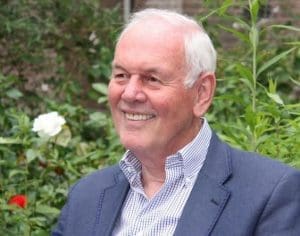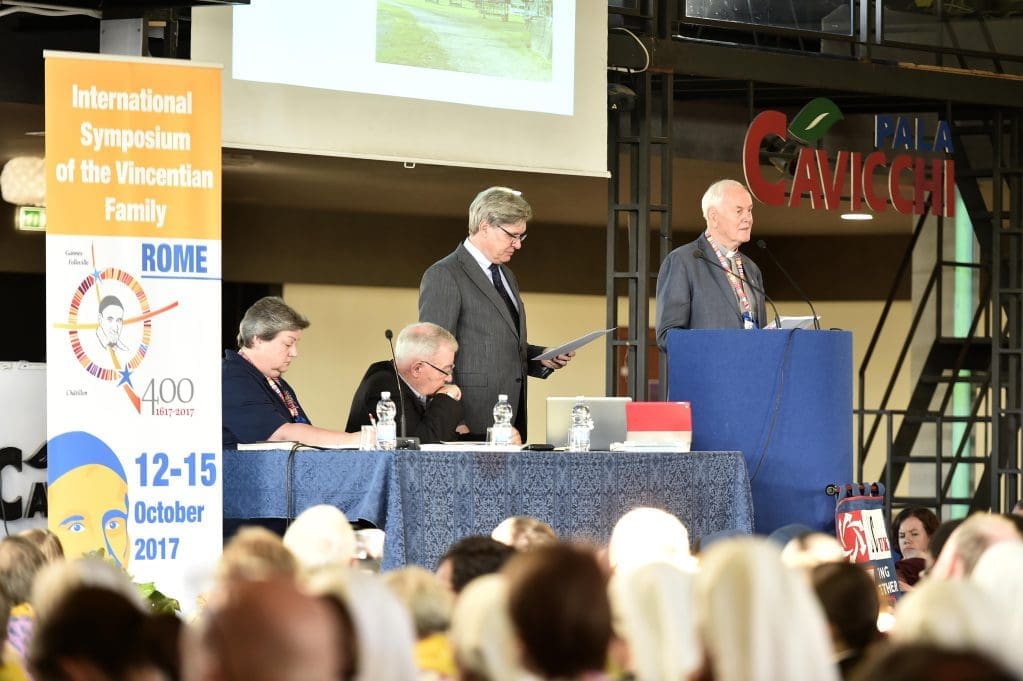 By Tjeu van Knippenberg c.m. em. professor of practical theology at Tilburg University and Peter Reijers a business consultant and coach, mainly active in the field of communication skills, often in building companies, in the field of construction. Both of them are involved in the Vincent de Paul Center The Netherlands.
By Tjeu van Knippenberg c.m. em. professor of practical theology at Tilburg University and Peter Reijers a business consultant and coach, mainly active in the field of communication skills, often in building companies, in the field of construction. Both of them are involved in the Vincent de Paul Center The Netherlands.
We have been invited to give a presentation during the Vincentian Symposium in Rome welcoming the stranger, October 12-15, 2017. We would like to offer you a summary of the content of our contribution.
In our presentation, we want to contribute to understanding the theme Welcoming the Stranger. In today’s world, it can be observed that the arrival of refugees raises different responses. So, in our country The Netherlands, there are various positive and negative responses to Pope Francis’ call to welcome, protect, sustain and integrate refugees. For Francis, this attitude and behavior are in accordance with the overreaching goal of his encyclical Laudato Si. This goal is: ‘to build an integrative and sustainable common house for everyone’.
But is it possible? A common house presupposes a degree of familiarity and mutual agreement. How do strangers fit in such a home? Then in our understanding ‘strange’ can be foreign, alien, odd, funny, peculiar, curious, weird, quaint, singular. All these possible meanings of ‘strange’ are an indication that the stranger belongs to a different order. He does not belong to the world as we have built up in our familiar environment.
How can the pope’s dream become true: strangers integrating in a common house? Can we learn from the Bible, from Vincent de Paul, from our own experience?
Looking at the Bible, we see that the relation to the stranger is an ambivalent one. At the one hand, JHWH is only there for Israel, the chosen people with its own land, language, and rituals. At the other side: how can other peoples be saved? The attitude towards the stranger is an ambivalent one. In this ambivalence, JHWH calls the people to keep the memory alive that it has been a foreigner and stranger itself in Egypt. Leviticus 19:33-34: ‘The foreigner residing among you must be treated as your native-born. Love them as yourself, for you were foreigners in Egypt. I am the LORD your God.’ Exodus is a call to come to our destination – when Israel was in Egypt land: let my people go. From slavery to freedom, from unconsciousness to consciousness, from selfishness to love, from ruling to serving. Return as a people and as an individual to your own history. Go back to your most inner self and see how it is to be a stranger and to be welcomed in a common house.
Ambivalence is the simultaneous presence of opposite feelings. We follow the story of Vincent de Paul as a young man in French 17th century culture. He has been a guardian of pigs and sheep. So he came as a young man to school from the countryside to the city of Dax. He experienced what it is to be alien, odd, curious. He was ashamed of his badly dressed father when he came to visit him. Through this experience, he was pulled back and forth between feelings of shame and love for the poor. He experienced in himself the ambivalence of feelings of reserve and approach. It is not without struggle that he became able to handle his different feelings He learned to hold up the ambivalence that was part of his existence. So, later on, he received the charism of mission: developing prophetic courage, i.e. respecting the countless refugees who came from areas of war to Paris. And so he got the charism of charity: becoming an icon of social commitment in receiving them and creating conditions for living.
Dealing with strangers is not easy. We know it and we can see it in political negotiations on quotas and in closing borders. What is the challenge of mission/charity today towards refugees and strangers? It is the challenge to work with the opposite feelings of staying away from and being attracted by the stranger. We can learn it from the meaning of the Greek word ‘xenos’. It means stranger and guest. Stranger refers to being different, guest refers to commonality. The one side stands for staying on yourself, creating a sheltered world. The other side refers to openness, learning something new. This tension is at work wherever people live.
How can we contribute to building up the contact between strange and familiar, understanding each other in our pluralism? We see signs of it in today’s world, parables that can address the challenge of the difference and that can inspire to live in harmony. An important example is the answer Pope Francis gives to important problems of our time. The Vincentian charism of mission is operationalized in Evangelii Gaudium. The Vincentian charism of charity is operationalized in Laudato Si’. As Vincentian Family in The Netherlands, we want, in cooperation with others, to contribute to the Pope’s policy.
The base of doing so comes up in remembering the exodus-history of Israel and the son-father-story of Vincent de Paul. These events teach us that a conversion to the stranger takes place by being conscious of the stranger in ourselves. This consciousness may lead us on the way of prophetic courage and social commitment.
………………………………………………………………………………………………
We were very happy to understand that the invitation to give the presentation in the Vincentian Symposium welcoming the stranger would give us the opportunity to approach the theme from the angle that Tjeu van Knippenberg offered you, as well as from the angle of the present corporate world, more specific: the Dutch corporate world. Vincent would have been quite popular there, no doubt.
This world would admire his advice: “Make no small plans!” No need here to explain Vincent’s conviction of the values of the Christian tradition. You are probably very much aware of that. As you are of his practical ambitions, I would think. Now, please allow me to share some thoughts connecting the dots between this, and my country and my working field. You all may know our image: “in matters of money, the fault of the Dutch is giving too little and asking too much.” I hope it does not apply to all of my countrymen all the time, but still… Platitudes sometimes have a reason for being there. The Dutch moved on, from exploiting slaves (we also invented apartheid, not something to be proud of) in VOC times, to being a country that has a solid place in the ranking of the happiest countries in the world. Year after year we are in the top ten. Consider this: Holland is the only country in the world without stray dogs. We are, let us say, organized. The building has a thorough foundation. Maybe as strong as the foundation of the Vincentian charisma? Let others be the judge of that. But, will all this welcome strangers? Will it solve the problem of poverty? We have no stray dogs, but we certainly have poverty.
Which confronts us, looking for solutions, once again with the question: Is it possible? So far, not always so good… Maybe we should reconsider our points of view, maybe we should keep the value of our traditions, but start handing over the flame, instead of the ashes. Can we truly accept the idea that “the stranger” may know things that we do not know? The idea that the stranger may be right?
And: maybe our “added value” has little meaning, if not perceived as “recognized value”?
In the corporate world, the companies that survive are quite often the companies that focus on the needs and wishes of their clients. And act upon that focus in a way that their clients value.
Maybe we should reconsider helping in the way we want – and always wanted – to help. Maybe we should consider helping in the way “the stranger” would like to be helped? Of course we all know that people do not always think what we think they think. Let us think about that. Let us not speculate about things we can be certain of, by simply asking. And than, by really listening to the answers to our questions. Not by listening to be understood, but by listening to understand. A lack of flexibility, of willingness to change when needed, of true interest in others, of motivation to do good in the eye of others, can be seen as a persistent kind poverty. With unintended consequences. Maybe even with the disappointment of a lack of gratitude?
If we decide that it is our responsibility, and act upon all that, wherever we can, and to inspire others, we may well by on our way to a Vincentian method. Maybe we will never fully solve the problem of poverty, of fully and effectively facing the challenge of welcoming the stranger. Maybe we learn from the poor, and the stranger, how to be better at it. Maybe Vincent would be seen as a stranger, by some. Let us investigate, not judge. After all, only then will he inspire us all to make no small plans, to be pragmatic and effective. To be a movement, and not an institution.
A Dutch marketer claims that vision without action is hallucination. Let us think, ask, listen, learn and act. On our way to welcome the stranger whenever and wherever we can.
Tags: Famvin400, Knippenberg, Speakers, Symposium, Welcoming the stranger



